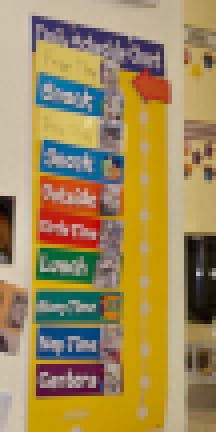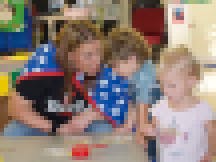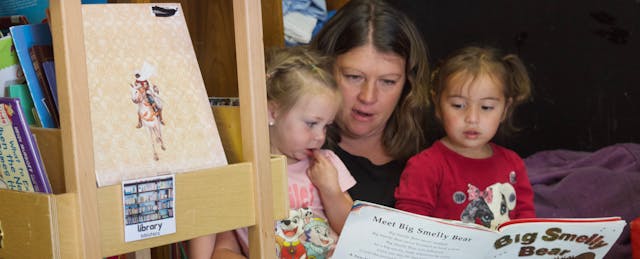BEAVER, Utah — On a recent morning in early October, when the day is in full swing, Dacie Derbidge settles onto a bean bag in a back corner at Little Leapers, the early learning center she opened two years ago, and hoists two girls onto her lap, balancing one on each thigh.
The girls, both toddlers, are immediately entranced by Derbidge’s animated reading of “Big Smelly Bear,” a children’s book by Britta Teckentrup. As she moves through the pages, Derbidge switches tones, adds inflection, pauses for dramatic effect and occasionally interrupts herself to ask the girls questions about the plot, testing their comprehension.
Behind her, and on a shelf in front of her, are signs that spell out the word “library,” with Spanish translations beneath them: “biblioteca.”
Across the room, next to where assistant director Erica Shotwell is teaching four of the children how to play bingo, is a poster spelling out the daily schedule—free play, then snack time, then outside play, then circle time and so on—recently updated to feature an image of what each activity looks like.

These subtle, yet significant visual and auditory cues are woven into the learning experience to support the children’s development—from bolstering language to fostering independence. Shotwell and Derbidge, the director of Little Leapers, have gradually remade the center and revamped their own instructional techniques over the last 10 months, thanks to experiential lessons and eye-opening discussions with peers that were made possible through Utah’s statewide rollout of free college courses for early childhood educators.
“It has changed the whole way we speak to the children and how our interactions take place within the classroom,” Derbidge says. “It has totally changed the dynamic of our center.”
Derbidge grew up in the small mountain town of Beaver, located about 200 miles south of Salt Lake City. After graduating high school in 1999, she held a series of positions working with children, eventually opening a home-based early learning program for children from birth through age five in the mid-2000s.
In a town like Beaver, which is home to 3,000 people and a single stop light, everyone knows one another, Derbidge says. Families in the community knew her and trusted her with their children. As a result, her program took off. She was soon serving 16 children, unusually high for a home-based provider, and had to hire additional staff.
During her nearly eight years as a home-based child care provider, Derbidge developed an understanding of just how critical it is for early learners to get a high-quality education. “I don’t think people realize how important it is to read to them, and sing to them, and talk to them, even as an infant,” she explains.
Yet she worried that, with so few child care options in town, many families were missing out on those early learning opportunities for their children. “I knew some of the kids weren’t getting what they needed. I saw a need for a deeper education in early child care” in the Beaver community, as well as within her own program.
On a whim, Derbidge decided to tour some buildings in town.
“It was time to step it up, and that's when I was like, ‘OK, we're just going to do it,’” she explains.
She bought an old Jehovah’s Witness worship center and turned it into Little Leapers in June 2017.
During her first year at the center, her enrollment numbers more than doubled to a total of 45 part- and full-time students, and she beefed up her staff, which now includes Shotwell, two other full-time teachers and a few part-time teachers.

At first, Derbidge was just trying to keep the operation running; she wasn’t zeroing in on the curriculum or the children’s learning outcomes yet. But as she settled into the new center—and attended more trainings as part of the 20 hours of annual professional development the state requires of its educators—Derbidge realized that the students at Little Leapers weren’t leaving prepared for kindergarten.
While Derbidge and her staff were considering how they could “bring in a more enriched learning environment for the kids,” the state was rolling out a suite of competency-based courses developed by the EarlyEdU Alliance, a collaboration of early childhood education experts led by the University of Washington. The courses were created to make higher education more accessible to early childhood educators and improve the quality of teaching in the field.
Other states, including Nebraska and Alaska, have recently introduced the EarlyEdU courses as well, but Utah is furthest along and, so far, the only one to complete the pilot phase.
Utah has few educational requirements for early childhood educators, most of whom only need to complete 2.5 hours of training prior to service and are not required to have completed a degree or credential. Only about 4 percent of early childhood educators in Utah have either an associate or bachelor’s degree, and just 10 percent have earned their Child Development Associate (CDA) credential, says Kellie Kohler, the state’s Head Start collaboration director and one of the people responsible for getting the EarlyEdU partnership off the ground in Utah.
State leaders are trying to change those stats. In 2016, state officials began to discuss creating pathways for educators to obtain accessible, affordable degrees in the field. The governor’s office and the Utah Head Start Association joined forces on the effort and began to build out the EarlyEdU platform, hosted for free by the Utah Education Network on Canvas, a learning management system. In fall 2017, the first Head Start pilots began. The following spring, the Office of Child Care joined the collaboration and hosted its own pilot course.
As of this fall, the courses are fully implemented. So far, 64 educators across Utah have completed an EarlyEdU course, 11 of whom have gone on to take one or both of the other offerings. Another 36 educators are on track to finish a course this fall.
Many more have started the courses but eventually withdrew, often due to scheduling conflicts or demanding assignments. But Heather Thomas, a professional development specialist in Utah’s Office of Child Care, says her team is getting better about communicating “what the course entails up front” and retaining the students who enroll.
Thomas adds that priority is given to particular groups and regions where access to the courses would have outsized impact: leaders like Derbidge who are positioned to make center-wide changes based on what they learn, rural areas with few high-quality child care options and child care facilities serving children from low-income families.
The state offers three courses in early childhood: Applied Child Development and Family Engagement, Positive Behavioral Support for Young Children, and Supporting Language and Literacy Development in Preschool. The courses—each 15 weeks long and offered in the spring and fall—are not meant to replace a degree, but rather to introduce early childhood educators to higher education by allowing them to earn up to nine college credits at minimal personal cost. Educators can take them for free, aside from an optional $63 fee to add the credits from Southern Utah University to their transcripts.
“It’s a stepping stone, a way for people to get their feet wet,” Thomas says of the courses. “It’s a way to try it out without too much risk.”
When an email about the courses first made its way to Derbidge, who has her CDA and a National Administrator Credential for child care center directors, but no college degree, she was ripe for the opportunity. After talking with her staff, she and Shotwell enrolled in the language and literacy course for spring 2019.
Video is a hallmark of the online courses. Educators record themselves in the classroom and upload the videos for discussion with classmates and feedback from instructors.
At the start of the language and literacy course, for example, educators upload a video of themselves reading two books to the children during class story time. Mid-way through the semester, and for a third time at the end of the semester, they upload another video reading the same books. Each time, they incorporate new strategies they’ve picked up in class, such as emphasizing alliteration, repeating letter sounds and pointing out rhyming words.
Derbidge recalls her experience playing back earlier videos from the course. “We would go back and watch our last video to see how we have grown,” she explains. “It was crazy—the change. I mean, even the way the children interacted with the story. They were way more interested.”
And in addition to learning from their instructor, Derbidge and Shotwell say they have taken note of dozens of ideas and approaches from their classmates, who are other early childhood educators living and working across Utah, and have already integrated them into their own practices.
“We're always like, ‘Oh, we're saving that idea! Oh, we are trying that tomorrow!’ And I think that’s part of it—our interaction back and forth with the other teachers,” notes Derbidge, who lives in a community with few other early childhood educators.
Since taking the language and literacy course, the Little Leapers teachers read more than children’s books to their kids; they introduce menus and maps as well. To support their bilingual students, they have also added Spanish translations to the labels they use in their classrooms, from posters with shapes, numbers and colors, to bins full of toys and different stations or “centers” in the room.
This fall, Derbidge and Shotwell are taking their second EarlyEdU course, on positive behavioral supports, where they upload videos of themselves teaching or interacting with children nearly every other week, Shotwell says.
Halfway through the course, they’ve already made some changes: rearranging their classroom to eliminate open spaces for running, making their centers smaller, developing a routine around transitions, and promoting self-regulation and expression.

That course is also where they got the idea to put a photo of each activity on the daily schedule. The visual cues and other strategies, like singing during transitions, help the children “mentally prepare” for what’s coming, Shotwell says.
Shotwell has also used some lessons from the positive behavior course to work closely with one of the girls in her class who frequently acts out, often by hitting, kicking or screaming. Shotwell now spends one-on-one time with the girl in the mornings and assigns her jobs—like being in charge of the soap dispenser when the class washes their hands—to give her a sense of responsibility.
“That has helped so much with her behaviorally,” Shotwell notes.

According to Derbidge and Shotwell, the EarlyEdU courses have effectively overhauled the instruction at Little Leapers, transforming it into a learning environment where kids leave better prepared and further developed than when they arrived.
And it’s not just the staff who think so. In October, Derbidge got word from the state that, after conducting on-site observations and evidence-based evaluations of Little Leapers, the Office of Child Care had issued the center a “high quality” rating, the second-highest of four tiers in Utah’s new Child Care Quality System. Derbidge attributes the score to many of the changes she and her staff have made as a result of the EarlyEdU courses.
“The word we use all the time now is ‘intentional,’” Derbidge says. “We are being intentional. Everything goes deeper than it did before.”


